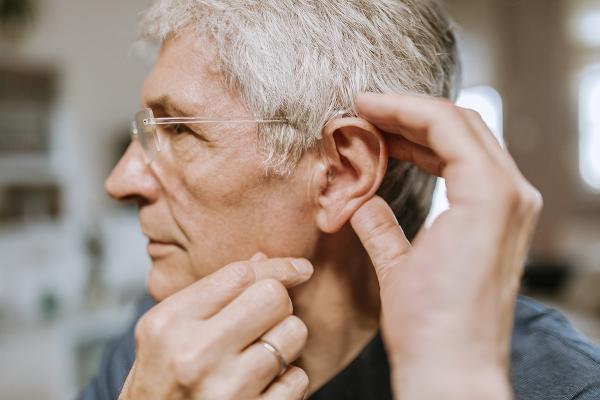
Could you be one of them?
Learn the truth behind some of the biggest misconceptions about hearing aids — and see how to find the right pair for you.

No matter how old you are, the ability to hear well is a big part of good health. But for older adults, it’s even more important. Studies show that even mild hearing loss may increase the risk of falls, depression and anxiety, and it may even increase the risk of developing dementia.1
The flip side? It’s all good news: Older adults who consistently use hearing aids are less likely to struggle with depression or their quality of life — and more likely to stay on their feet.2 That’s because hearing aids are designed help you hear better. That means you can continue to take part in conversations and stay socially active, which in turn helps keep your brain sharp. Those are all keys to living a happier life.3
People using hearing aids may even live longer. A recent study showed that people with hearing loss who regularly used hearing aids had a 24% lower chance of dying prematurely than those who never wore them.4
But only about 1 in 6 Americans who need hearing aids use them.5 How come? Turns out, there are lots of myths and misunderstandings about hearing aids that may keep people from getting them.
Read on to learn the facts behind some of these common myths — and see how hearing aids could help you live a better and healthier life.

Could you be one of them?
It is true that almost everyone’s hearing gets a bit worse as they reach their 50s and 60s. About 10% of adults ages 55 to 64 have disabling hearing loss, and 22% of adults ages 65 to 74.6 But you can do something about it. You don’t have to keep struggling to hear your favorite music or TV show or conversations with your friends. Hearing aids may help many people hear better.
The first step? Seeing a hearing care professional, such as an audiologist, for a comprehensive hearing test.
After all, if you had trouble seeing, you’d get an eye exam to find out if you need glasses. So, if you do have hearing loss, hearing aids may be the best solution. Your hearing care professional will be able to help you find the right ones for your lifestyle and degree of hearing loss.
Through EPIC Hearing Healthcare, you get up to 3 follow-up visits at no extra cost — and a trial period to try out your new prescription hearing aids. Learn more.
“These are not your grandfather’s hearing aids,” says Jan Storhaug, Au.D. She’s the associate director, network and vendor relations, for UnitedHealthcare Hearing. “Most of the time, you can’t even see them. They’re more comfortable, less bulky, and cosmetically appealing. You can choose a color to match your hair — and they’re so small, they often go unnoticed.”
Maybe you tried hearing aids a long time ago and they didn’t seem to help. But that was then. This is now.
With so many new kinds of hearing aids, you and a hearing care professional can work together to find the right one for you, Storhaug explains. For example, she says, “People sometimes complained that their ears felt plugged up when they wore hearing aids. This happens less often today with some of the newer models.”
Plus, hearing aids have come a long way. “Hearing aids are technologically advanced,” she says. “Some even connect to your smartphone. With some models, you can stream your music and audio directly into your hearing aids. You can answer the phone just by pushing a button on your hearing aid, and you can hear the television better.”
Not true, Storhaug says. There are many different models of hearing aids in a variety of price ranges. You can even buy them over the counter (OTC) through UnitedHealthcare Hearing, at pharmacies and big-box stores. OTC hearing aids are intended for adults with perceived mild to moderate hearing loss.7
And more insurance plans are offering benefits for hearing aids. “When it’s time to renew your health insurance, check your plan to see if there’s a hearing benefit. This can make hearing aids more affordable,” says Storhaug.
Over-the-counter devices come in a range of prices — from a couple of hundred dollars to a few thousand, according to the National Council on Aging.8 Usually, the more technologically advanced the hearing aids are, the more expensive they tend to be.
In fact, just a few simple steps can keep your hearing aids working well for years. Try these tips from the American Speech-Language-Hearing Association:9
That’s a big misunderstanding. Today’s hearing aids don’t just turn the volume up to 11. They are equipped with the latest technology to help you adapt and adjust seamlessly to the surrounding environment. Plus, all that technology mimics what your brain does to produce a more natural sounding experience.
Joining friends for dinner at a noisy restaurant? Heading to a concert or an office party? You may not even need to adjust your hearing aids to help you hear better in each situation, says Storhaug.
With the right hearing aid, you can enjoy the beautiful sounds of your world. “We know that one solution doesn’t fit everyone,” says Storhaug. “But we’re working to offer the right solutions for our members. It’s a good idea to get your hearing tested, work with a hearing care provider, and find out which options are right for you.”
And you can feel good that you’ll be taking care of your overall health at the same time.
Sources
Information is for educational purposes only and is not a substitute for the advice of a licensed medical provider. Consult your provider prior to making changes to your lifestyle or health care routine.
Hearing aids purchased in the Silver technology level will receive 1 follow-up visit.